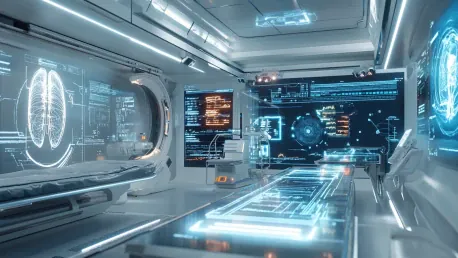At the forefront of healthcare innovation, the Cedars-Sinai Accelerator has unveiled its 10th class encompassing 10 avant-garde health-tech startups. This cohort is set to push the boundaries of healthcare technology, transforming patient care and operational efficiency through advanced artificial intelligence (AI) and machine learning solutions. The accelerator program, renowned for providing a robust platform to health-tech startups, seeks to expedite the development and implementation of pioneering technologies aimed at enhancing healthcare delivery and patient outcomes.The Cedars-Sinai Accelerator offers each selected company a $100,000 investment along with a bespoke mentoring program featuring over 300 Cedars-Sinai clinicians, executives, and healthcare professionals. This unique approach ensures that the startups are not just financially supported but also receive invaluable insights and guidance from seasoned experts in the healthcare industry. By fostering innovation and collaboration, the accelerator aims to address some of the most pressing challenges in healthcare, from diagnostic accuracy to efficient patient monitoring.
Emphasis on AI and Machine Learning
A central theme among the startups in this cohort is the deployment of AI and machine learning to tackle pressing healthcare challenges. HealthPlus.ai’s PERISCOPE system stands out as an innovative solution that harnesses AI to predict infection risks, enabling clinicians to intervene earlier and potentially reduce hospital stays. This technology exemplifies the growing trend of using AI to enhance clinical decision-making and improve patient outcomes. Similarly, iCardio.ai leverages AI to analyze echocardiograms, providing accurate reports that identify various cardiac pathologies, thereby aiding cardiologists in delivering precise diagnoses and effective treatments.AI-driven advancements are not limited to diagnostic tools but extend to various aspects of patient care. Fraiya, for example, utilizes AI to enhance the interpretation of pregnancy ultrasounds, aiming to bolster diagnostic accuracy and improve patient care during a critical period. This application of AI underscores a broader trend within the cohort toward data-driven, precise, and proactive healthcare. By integrating AI into healthcare solutions, these startups are paving the way for more efficient and reliable medical practices, ultimately benefiting both patients and healthcare providers alike.
Focus on Women’s Health
The Cedars-Sinai Accelerator has placed a significant focus on women’s health, addressing both acute and chronic conditions. Among the standout companies in this area is HERA Biotech, which is developing non-surgical diagnostics for endometriosis, a notoriously difficult-to-diagnose condition affecting millions of women worldwide. This innovative technology seeks to provide definitive diagnoses, facilitating timely and appropriate medical intervention. By offering a clear and accurate diagnostic tool, HERA Biotech aims to improve the quality of life for women suffering from this condition and reduce the time to effective treatment.In addition to addressing endometriosis, the accelerator cohort includes NOMA AI, a startup dedicated to reducing maternal mortality rates. NOMA AI uses sophisticated AI algorithms to predict and manage the risk of maternal hemorrhage, a leading cause of maternal deaths globally. This critical innovation aims to save lives by ensuring that high-risk pregnancies receive the immediate and specialized care they require. By focusing on these critical areas of women’s health, the Cedars-Sinai Accelerator is contributing to the development of life-saving technologies that can have a profound impact on maternal and reproductive health.
Enhancing Patient Monitoring and Post-surgical Care
Remote patient monitoring plays a pivotal role in the offerings of several startups within the Cedars-Sinai Accelerator cohort. Singapore-based Kinexcs has developed KIMIA Recover, a device that tracks joint conditions post-surgery. This technology grants healthcare providers the ability to monitor recovery progress remotely, allowing for timely interventions and reducing the need for frequent in-person visits. By enabling continuous monitoring, Kinexcs’ solution enhances patient management and outcomes, ultimately leading to more efficient and effective postoperative care.Similarly, Momentum Health from Canada applies AI and digital health technology to screen for and monitor the progression of scoliosis. This innovative approach allows for early detection and continuous monitoring, improving patient management and outcomes. These technologies underscore a movement towards continuous patient engagement, where healthcare becomes an ongoing process rather than a series of isolated events. Remote monitoring solutions promise to reduce the strain on healthcare facilities while improving patient satisfaction by providing timely and personalized care.
Pioneering Administrative and Logistical Solutions
Streamlining administrative tasks and optimizing logistic operations are also focal points within the Cedars-Sinai Accelerator cohort. Elaborate provides a solution that automates administrative tasks and simplifies lab results for patients, reducing clerical burdens on healthcare providers and enhancing patient comprehension of their health data. This tool allows patients to easily understand their lab results, empowering them to take an active role in their healthcare journey. By automating these processes, Elaborate aims to improve efficiency and accuracy in healthcare administration, ultimately benefiting both providers and patients.Another notable company addressing logistical complexities is Pulse Charter Connect, which offers an innovative digital platform for optimizing the coordination and tracking of organ transportation. This system is critical in ensuring the timely and efficient delivery of organs for transplantation, a vital factor in saving lives. By streamlining the logistics of organ transport, Pulse Charter Connect aims to reduce delays and enhance the overall success rates of organ transplants. These administrative and logistical solutions highlight the diverse ways in which technology can improve the efficiency and effectiveness of healthcare operations.
Early Detection and Preventive Care
Several startups within the Cedars-Sinai Accelerator emphasize the importance of early detection and preventive care, aiming to mitigate health risks before they escalate. Elaborate’s tool for automating lab results aids patients and providers in understanding and acting on lab results more readily, facilitating early intervention and preventive care. By providing clear and actionable insights, this technology helps in the early identification of potential health issues, allowing for timely and appropriate medical responses.Furthermore, Neu Health from the UK focuses on managing symptoms of chronic neurodegenerative conditions like Parkinson’s and dementia through AI and machine learning. This proactive approach helps in early symptom detection and personalized care management, significantly improving the quality of life for patients with these conditions. These innovative solutions reflect a shift towards anticipatory healthcare, where technology aids in predicting and preventing health issues rather than solely reacting to them. By focusing on early detection and preventive care, the Cedars-Sinai Accelerator cohort is contributing to a more proactive and efficient healthcare system.
Conclusion
Leading the charge in healthcare innovation, the Cedars-Sinai Accelerator has introduced its 10th class, comprising 10 cutting-edge health-tech startups. These companies are poised to revolutionize patient care and operational efficiency through state-of-the-art artificial intelligence (AI) and machine learning technologies. Known for providing a strong support system, the accelerator aims to fast-track the advancement and application of groundbreaking technologies that improve healthcare delivery and patient outcomes.Each chosen startup benefits from a $100,000 investment and a tailored mentoring program involving over 300 Cedars-Sinai clinicians, executives, and healthcare experts. This distinct approach ensures that the startups receive not only financial backing but also priceless advice and insights from experienced professionals. The accelerator’s goal is to cultivate innovation and collaboration, addressing critical challenges in healthcare, including precise diagnostics and effective patient monitoring.By merging innovation with expertise, the Cedars-Sinai Accelerator is set to make significant strides in overcoming some of the most urgent issues in modern healthcare.









